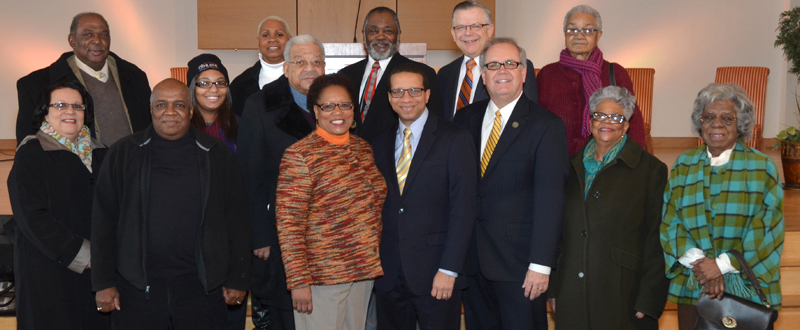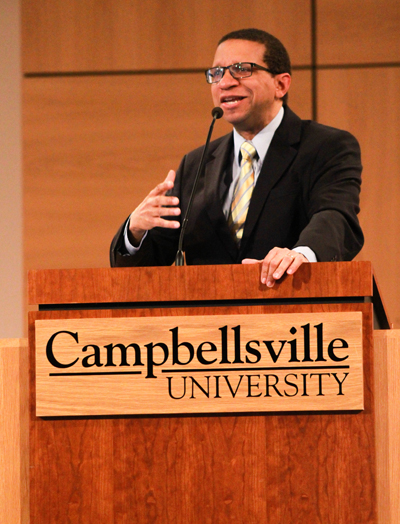 |
| Friends and former congregation members attended Campbellsville University’s chapel service featuring Dr. David Goatley. Attending were from left: back row — from left: Jerry Cowherd; Kay Johnson; the Rev. James Washington; Dr. John Chowning, vice president for church and external relations and executive assistant to the president; and Mildred Smith. From left: front row — Mary Cowherd; Randy Taylor; Jade Turner; the Rev. Roddy Turner; Wanda Washington; Goatley; Campbellsville Mayor Tony Young; Jean Allen; and Margaret Stewart. (Campbellsville University Photo by Joan McKinney) |
By Kevin Thomas, student news writer
CAMPBELLSVILLE, Ky. –Dr. David Goatley, executive secretary-treasurer of the Lott Carey Baptist Foreign Mission Convention, and former pastor of First Baptist Church in Campbellsville, talked of “Windstorms and Black History” during a presentation at Campbellsville University’s chapel Feb. 12.
Goatley said, “Being black in America is something like living in windstorms, you can’t see what is hindering your progress, but you can feel it and feel the results.”
Goatley spoke on two issues, or “storms,” facing African-Americans in today’s time. He said income and equality and disproportionate rates of incarceration face today’s African-Americans. Goatley said, “Despite these storms, African-Americans have and will continue to make history.”
“It’s not living in a perpetual storm, but the storms come frequently enough and unpredictably enough, that you always have to be aware,” Goatley said.
 |
| Dr. David Goatley spoke about “Windstorms and Black History”at Campbellsville University’s Ransdell Chapel Feb. 12. (Campbellsville University Photo by Joshua Williams) |
In the context of Christian African-Americans history makers, Goatley said, “They have made contributions to their community, their country, and to the world and they do so because they have learned something from Jesus about how to be a blessing, and it’s a lesson that is useful for all.”
Goatley spoke from the gospel of Mark, where Jesus feeds the 5,000, with five loaves of bread and two fish. From this passage, Goatley shared four insights and how black history makers have learned from Jesus, the first of these being that people who have needs are not nuisances.
Goatley said, “We live in a cultural and a political climate, where people who have needs are blamed for having needs. Jesus does not see people with needs as being nuisances, the way that Jesus responds to people with needs is with compassion. He sees them as people who happen to have needs at the moment, and all of us on occasion find ourselves in need of some help.”
Goatley spoke of the compassion that we can give saying “Even if you’re doing well today, we all find ourselves on the other side sometime and somebody stands today in need of your compassion and you’ll be in need of someone else’s.”
Secondly, Goatley said people are to embrace those with needs, not escape from them. He pointed to Jesus’s disciples, who were eager to send the crowd away to get food yet says that Jesus said “you feed them.”
Goatley said, “As you have privilege with your education, will you send others away, or will you use your opportunities to embrace their needs?”
Taking an inventory of your assets is the third point Goatley addressed. “Those who make the most impact in this world, the history makers, learn not to focus on the liabilities, but on the assets. If we focus on what we don’t have, we can’t focus on what we do have.”
Goatley focuses on how Jesus asked to take an inventory of the food that was available which equaled out to five loaves of bread and two fish. With this parable, Goatley spoke on how it can apply to not only finances or monetary dealings, but also personal traits and gifts.
Goatley’s final insight spoke of generosity and the contributions that we can make to society with our gifts.
Goatley said, “God does not have a limited amount of opportunities to make available to us, but God is more interested in whether we have a sense of gratitude and generosity, so that we can be grateful and generous at the same time.”
Goatley has served as pastor, university professor and seminary professor. He earned two degrees from the University of Louisville (an associate of arts in science and a bachelor of science) and The Southern Baptist Theological Seminary where he received a master of divinity and his Ph.D.
Goatley is the author of two books, “Were You There?: Godforsakenness in Slave Religion” and “A Divine Assignment: The Missiology of Wendell Clay Somerville.” Also, he was the editor of “Black Religion, Black Theology: Selected Writings of J. Deotis Roberts.” In addition, he has written journal articles, book chapters and online essays.
Also he has served as president of the North American Baptist Fellowship, the regional body of more than 30 Baptist denominations and organizations affiliated with the Baptist World Alliance.
Goatley, his wife, Pamela, and their son, Atiba Emmanuel, reside in the metropolitan Washington, D.C. area.
Campbellsville University is a widely acclaimed Kentucky-based Christian university with more than 3,600 students offering 63 undergraduate options, 17 master’s degrees, five postgraduate areas and eight pre-professional programs. The website for complete information is campbellsville.edu.
